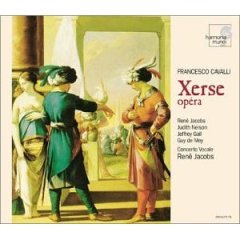Francesco Cavalli – Xerse (2000)
Francesco Cavalli – Xerse (2000)

CD1
1. Orontea: Prologue
2. Orontea: Act I, scenes 1 & 2
3. Orontea: Act I, scenes 3 à 6
4. Orontea: Act I, scenes 6 à 9
5. Orontea: Act I, scenes 10 & 11
6. Orontea: Act I, scenes 12 à 14
CD2
1. Orontea: Act I, scenes 15 & 16
2. Orontea: Act I, scene 17
3. Orontea: Act I, scenes 18 à 20
4. Orontea: Act II, scenes 1 à 4
5. Orontea: Act II, scenes 4 & 5
6. Orontea: Act II, scene 6
7. Orontea: Act II, scene 7
8. Orontea: Act II, scenes 8 à 10
9. Orontea: Act II, scene 11
CD3
1. Orontea: Act II, scenes 12 à 14
2. Orontea: Act II, scene 15
3. Orontea: Act II, scene 15a
4. Orontea: Act II, scenes 16 à 18
5. Orontea: Act II, scenes 19 & 20
6. Orontea: Act III, scenes 1 à 4
CD4
1. Orontea: Act III, scenes 5 & 6
2. Orontea: Act III, scenes 7 & 8
3. Orontea: Act III, scenes 9 & 10
4. Orontea: Act III, scenes 11 à 13
5. Orontea: Act III, scenes 14 à 17
6. Orontea: Act III, scene 18
7. Orontea: Act III, scenes 19 & 20
Performer:
Judith Nelson, Jeffrey Gall, Guy de Mey, Jill Feldman
Concerto Vocale
Rene Jacobs – conductor
Written on the libretto that Handel also used 84 years afterwards, Xerse is a later work of Cavalli's than any of his other operas recorded complete and issued in this country, except for Ercole amante (his only one not composed for an Italian audience). The text adopted here is that of its premiere in Venice in 1654 (or its image revival three years later in Bologna), but two numbers have been included from the Paris version of 1660, which failed because of Lully's malicious intrigues and the French courtiers' inability to understand the Italian libretto, which is unusually colloquial and often amusing. The present performance is a spinoff from the presentation at the Bordeaux Festival in May 1985, for which Rene Jacobs felt it necessary to incorporate a few sinfonie from other works and slightly to augment the instrumentation (all scrupulously documented in the notes): this, however, one is relieved to find, is very discreet (only five strings, two recorders and, once or twice, two trumpets are employed, plus a continuo of two harpsichords, theorbo, guitar and organ) and is a world removed from the inflated Leppardizations which have been responsible for giving a false idea of Cavalli. In the absence of the original prologue, Jacobs has also added the delightful and entertaining prologue from Ciro (which was first produced only a fortnight after the premiere of Xerse).
Xerse is an astonishingly fine work, on a par with, but more `advanced' than, the operas of his master Monteverdi. It is brimful of melodic invention, harmonic piquancy, stylistic diversity and vitality in the recitatives (which frequently merge into ariosi), and vocal ensembles are unusually numerous. Dramatically it is a most effective high comedy. The plot concerns the distinctly un-regal behaviour of Xerxes, king of Persia, who forsakes his betrothed (Amastre) and becomes enamoured of Romilda, one of the Prince of Abydos's daughters—who however loves, and is loved by, his brother Arsamene, who in turn is loved by Romilda's sister Adelanta. A complicated mix-up ensues, owing to a stupid servant letting a love-letter fall into wrong hands and to misunderstandings arising on all sides. This kind of action demands two qualities above all- -absolutely clear enunciation, and intelligent and varied pacing of recitatives: on both counts Jacobs's stylish direction (which extends to the excellent instrumental playing) is most successful. Literally every word comes through (and for those without Italian there is an English translation, though this is not always quite accurate). This is an undoubted success: a hitherto unheard opera of striking quality, playing and singing that are extremely musicianly and musical (by no means always synonymous!); and impeccably clean recording. ---L.S., ottosoperahouse.blogspot.com
download: uploaded anonfiles mega 4shared mixturecloud yandex solidfiles
Zmieniony (Sobota, 28 Wrzesień 2013 11:04)








